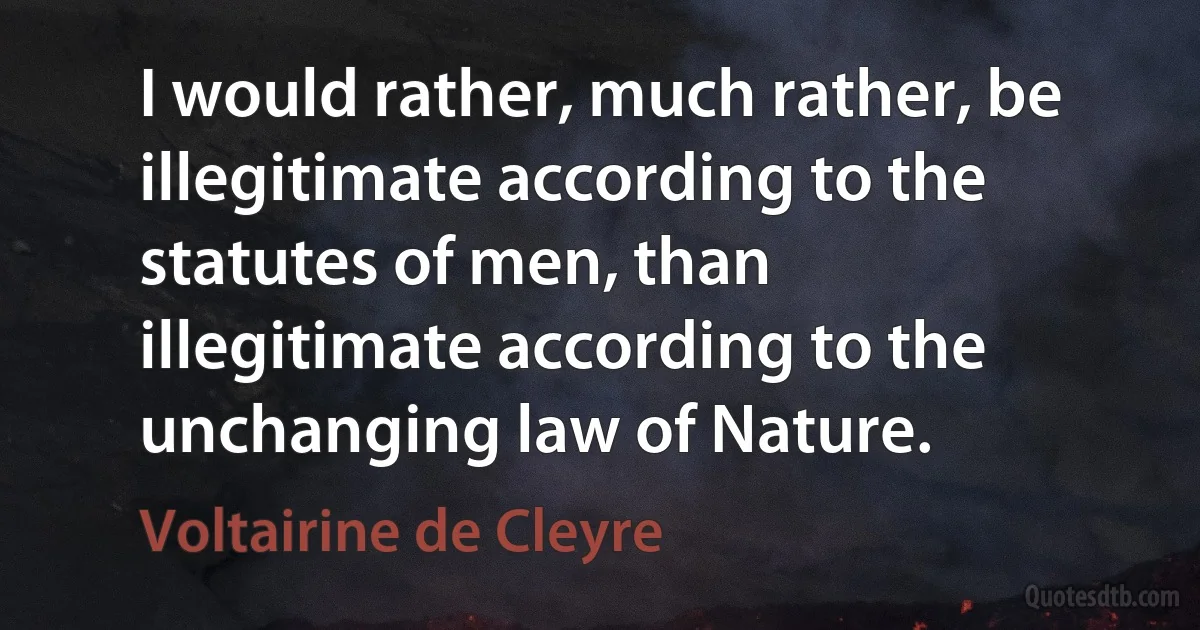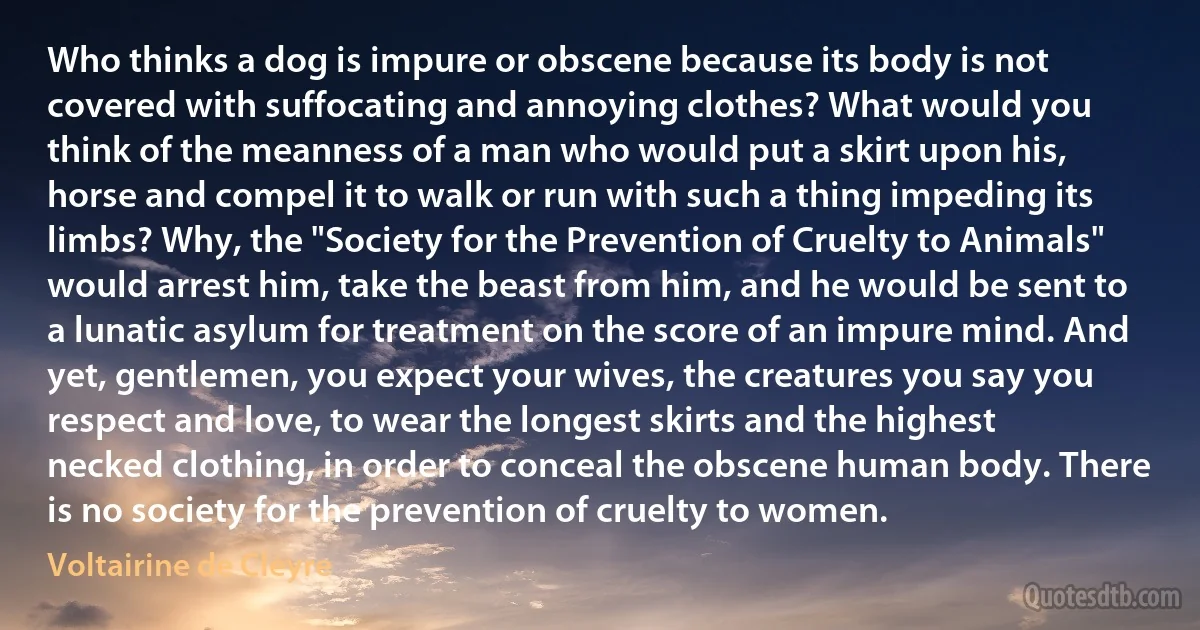Voltairine de Cleyre quotes - page 4
Years! Years, ye shall mix with me!
Ye shall grow a part
Of the laughing Sea;
Of the moaning heart
Of the glittered wave
Of the sun-gleam's dart
In the ocean-grave. Fair, cold, and faithless wert thou, my own!
For that I love
Thy heart of stone!
From the heights above
To the depths below,
Where dread things move, There is naught can show
A life so trustless! Proud be thy crown!
Ruthless, like none, save the Sea, alone!

Voltairine de Cleyre
Bear it aloft, O roaring flame!
Skyward aloft, where all may see.
Slaves of the World! Our cause is the same;
One is the immemorial shame;
One is the struggle, and in One name -
Manhood- we battle to set men free.
"Uncurse us the Land!" burn the words of the Dead,
Written-in-red.

Voltairine de Cleyre
For the way is not strown with petal soft,
It is covered with hearts that weep,
And the wounds I tread touch a deeper source
Than you think it mine to keep. Down the years I shall move without you,
Yet ever must feel the blow
That caused me a deeper pain to give
Than you will ever know.

Voltairine de Cleyre
Note the difference between a right and a privilege. A right, in the abstract, is a fact; it is not a thing to be given, established, or conferred; it is. Of the exercise of a right power may deprive me; of the right itself, never. Privilege, in the abstract, does not exist; there is no such thing. Rights recognized, privilege is destroyed.
But, in the practical, the moment you admit a supreme authority, you have denied rights. Practically the supremacy has all the rights, and no matter what the human race possesses, it does so merely at the caprice of that authority.

Voltairine de Cleyre
A man won't steal, ordinarily, unless that which he steals is something he cannot as easily get without stealing; in liberty the cost of stealing would involve greater difficulties than producing, and consequently he would not be apt to steal. But suppose a man steals. Today you go to a representative of that power which has robbed you of the earth, of the right of free contract of the means of exchange, taxes you for everything you eat or wear (the meanest form of robbery), - you go to him for redress from a thief!

Voltairine de Cleyre
He cried out through the letter of Dr. Markland, that a young mother lacerated by unskillful surgery in the birth of her babe, but recovering from a subsequent successful operation, had been stabbed, remorselessly, cruelly, brutally stabbed, not with a knife, but with the procreative organ of her husband, stabbed to the doors of death, and yet there was no redress!
And because he called a spade a spade, because he named that organ by its own name, so given in Webster's dictionary and in every medical journal in the country, because of this Moses Harman walks to and fro in his cell tonight. He gave a concrete example of the effect of sex slavery, and for it he is imprisoned. It remains for us now to carry on the battle, and lift the standard where they struck him down, to scatter broadcast the knowledge of this crime of society against a man and the reason for it; to inquire into this vast system of licensed crime, its cause and its effect, broadly upon the race.

Voltairine de Cleyre
Let us have Men, Men who will say a word to their souls and keep it - keep it not when it is easy, but keep it when it is hard - keep it when the storm roars and there is a white-streaked sky and blue thunder before, and one's eyes are blinded and one's ears deafened with the war of opposing things; and keep it under the long leaden sky and the gray dreariness that never lifts. Hold unto the last: that is what it means to have a Dominant Idea, which Circumstance cannot break. And such men make and unmake Circumstance.

Voltairine de Cleyre
In the twentieth century de Cleyre and Goldman elaborated Lizzie May Holmes's ideas. Their views provided the theoretical foundation for the Modern School, the first full-scale anarchist educational experiment in the United States...Although de Cleyre's years as a teacher helped to form her educational ideas, both she and Goldman became associated with the Modern School movement as a result of their involvement in the cause of Francisco Ferrer.

Voltairine de Cleyre
The Puritans had accused the Quakers of "troubling the world by preaching peace to it." They refused to pay church taxes; they refused to bear arms; they refused to swear allegiance to any government. (In so doing they were direct actionists, what we may call negative direct actionists.) So the Puritans, being political actionists, passed laws to keep them out, to deport, to fine, to imprison, to mutilate, and finally, to hang them. And the Quakers just kept on coming (which was positive direct action); and history records that after the hanging of four Quakers, and the flogging of Margaret Brewster at the cart's tail through the streets of Boston, "the Puritans gave up trying to silence the new missionaries"; that "Quaker persistence and Quaker non-resistance had won the day."

Voltairine de Cleyre
No single figure better represents the complexities and contradictions, the strengths and weaknesses, or the ambiguities of anarchist-feminism than Voltairine de Cleyre. Yet until recently we knew very little about the second most important woman in the American anarchist movement, in part because Emma Goldman-who had served as this country's symbol of anarchist womanhood during her and de Cleyre's lifetimes-eclipsed de Cleyre after their deaths as well...de Cleyre's career was marked by less notoriety and by a quieter, though nonetheless genuine, defiance of American norms of femininity. To a degree, de Cleyre chose a comparatively less aggressive role than Goldman. Although during her early years as an anarchist propagandist she had participated in a wide variety of reform and radical activities, from the late nineties until her death she worked largely among anarchists.

Voltairine de Cleyre
In the final analysis, neither woman was successful in her most cherished goal: to bring about a revolution that would crush capitalism, topple male supremacy, and usher in new freedoms for men, women, and children. In another sense, however, both were great successes. Goldman felt that despite her defeats, her life was indeed worth living. De Cleyre, a more introspective and questioning person, sometimes felt doubt about her choices. Yet she lived her life as a free and independent woman, and participated in a work that she believed had the potential to liberate humankind economically, politically, socially, and sexually. Because of de Cleyre, and the other anarchist-feminists, we can understand far better what it meant to choose to live in contradiction to the larger society, and to be aware of the costs and consequences of such a choice.

Voltairine de Cleyre


